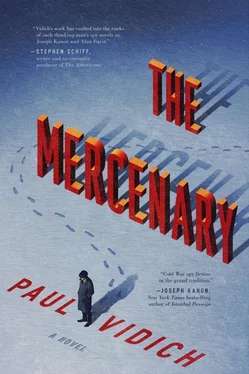“I don’t have evidence.”
“You may not know what you have. If you were the dissolute, hard-drinking embassy employee you claim, you’d be sweating by now, or screaming innocence, but look at you. So calm, so guilty. So well trained. Your cleverness incriminates you. I had my doubts, but Natalya was certain. I see she is right. You are CIA.” Posner’s head shifted side to side like a viper. “Why are you in Moscow?”
Garin didn’t respond.
“Your presence will be of interest to my colleagues, but that’s not why I have you here.” Posner looked around the bedroom before his eyes settled again on Garin. “Talinov is Second CD and I am First CD. The famous KGB compartmentalization keeps us ignorant of each other’s work, but I hear gossip, or have drinks with a mutual colleague who lets something slip, or see documents I’m not supposed to see. I have heard Talinov thinks the embassy is running an asset inside the GRU or the KGB, a senior military specialist. There is a list of men who use a particular copier that is going around. I am not on the list, but men who work for me are.” Posner stared at Garin. “Are you his handler? Is that why you’re here?”
Garin raised an eyebrow. “If I were, would I be so stupid to let myself fall into this trap?”
Posner went for his drink but found the glass empty. He paced the room nervously, like a caged zoo lion. “I don’t think you’re stupid.”
Garin saw in Comrade Posner the brooding anxiety of a man on death row. Posner’s tired eyes and the beads of sweat on his upper lip helped Garin believe what he was hearing, that he was being recruited by one side against the other in a power struggle among rival KGB factions. He tried to imagine the contention and distrust that had prompted this extraordinary circumstance. Garin possessed a tenacious mind, and once he heard something that he didn’t fully understand, he didn’t banish the problem to forget it. He kept the mystery alive, knowing that unless he had a satisfactory answer, he was in danger of being drawn deeper into a labyrinth of deceit. Suddenly, he had the uncomfortable sense that he had lived this moment before. A similar room. Friendly blandishments from a clever interrogator. Garin looked at Comrade Posner. He saw an erudite, self-important Russian with nervous eyes.
Garin shrugged. “What else?”
“A common interest.”
“We have no common interests.”
Posner nodded at the bedroom door. “She is a common interest.”
It was later, when he reflected on Posner’s comment, that he understood Posner’s affectionate reference was a threat.
“It is in your interest—the CIA’s interest—to discredit Talinov,” Posner said. “If it could be proved that Zyuganov was falsely accused and wrongly executed, Talinov would be exposed, tried, and punished.” He watched Garin. “I see you are skeptical of my motives. And you should be. It’s an unusual request. The only way you could surprise me is to say that General Zyuganov wasn’t a traitor.”
“A traitor to what?” Garin asked. “Family? Russia? The Party? Maybe he was a CIA asset.” Garin smiled at the confusion he saw on Posner’s face. Lying had always come naturally to Garin. Falsehoods had been his childhood protection from a Russian mother who lied to her American husband. Lies, he had discovered, were more helpful and sometimes more satisfying. They gave him power. Lies kept people from being able to plunder his truths. As a consequence, he had developed a taste for secrecy and a facility for lying. And he knew that the appearance of a lie could sometimes be more effective than the lie itself.
“I don’t believe it,” Posner said flatly. “But if it was true, and you would know, there is still reason you would want Talinov discredited.”
The two men looked at each other, and a communion of interests was understood. It was a rare moment of agreement that had nothing to do with trust and everything to do with self-interest.
“I need evidence,” Posner said. “The men who made your visa can forge the incriminating documents I need.”
“Are we done here?”
“No.”
Garin was already moving to the door. “What else?”
“You are getting a bargain. If Talinov is removed, your asset is protected. I am told he is an important person.”
“You think this puts you in a position to make requests?” Garin’s hand swept the room.
“Yes, I believe it does.”
“What do you need?”
“Money.”
“For what?”
“For me.”
Garin scoffed. “You should be paying me.” Then he cocked his head. “Who do you work for?”
“Myself.”
Garin heard in his abrupt answer, carelessly thrown out like a boast, a truth. Greed. It didn’t surprise Garin. There was never enough money for the man with an appetite. “How much?”
Posner threw out a number.
Garin laughed.
“How important is he to the CIA?” Posner asked.
“Half.”
Posner shook his head. “I’m paid no better than you. I can’t live on my shitty pension.”
Garin was silent, giving the impression it was a hard bargain.
“How much is on you?” Posner asked.
Garin produced a bundle of US currency he was carrying for GAMBIT. “A down payment,” he said, handing over the envelope and watching Posner count. “Don’t contact me,” he added. “I will communicate through her, and she will pass along everything: account number, wire instructions, evidence against Talinov. Everything through her.”
Garin slipped out of the building and stayed in shadow, away from the streetlight, a precaution until he was certain no one was waiting to follow. His breath plumed in the night air. He regretted leaving home without his gloves and wondered what else he’d forgotten. He went down the list of things he hadn’t foreseen, all of which had changed the game. This had been his life too long. He darted into the street and hopped on an empty, brightly lit tram.
Later, he drafted a summary of the meeting for Mueller, adding at the end: I’ve been away six years, but nothing has changed. Personal survival among KGB rivals is still a blood sport. Middle-aged intelligence officers look forward to becoming pensioners with a dacha and a small vegetable garden and maybe, if they’re lucky, a nest egg of hard currency.
TWO DAYS LATER, GARIN RECEIVED an urgent note from Mueller instructing him to contact Ronnie, who would give him after-hours access to the Bubble’s secure telephone.
Garin stood alone in the dark conference room. Waiting. The phone rang almost exactly at the time arranged. He lifted the black handset on the second ring, but there was no one on the line. Static. He hung up. It was then that he saw an office light on at the end of the hall. Someone in Moscow Station was working late. The telephone rang again.
“Hello?”
“Alek, it’s me.”
Garin took his eyes off the office light. He had rehearsed how he would explain what had happened, and he’d decided what he could say and what he would avoid. “You got my list of his requests?” he asked.
His note had been explicit. He wanted a classified internal KGB memo that sat in CIA archives altered to implicate Talinov in General Zyuganov’s treason; he asked that Technical Services falsify coded transcripts that rewrote the history of General Zyuganov’s defection; he’d specified dates, paper stock, and the exact Soviet stamp.
“What’s going on?” Mueller demanded.
“Posner wants to discredit Talinov. There’s a power struggle inside the KGB. Who knows what’s really going on, but they’re rivals and it is unstable, and I have been sucked in. Understand? What Posner doesn’t know is that the documents I want Technical Services to create will do the opposite of what he wants. They will implicate him.”
Читать дальше












